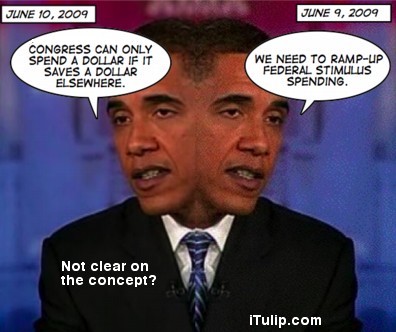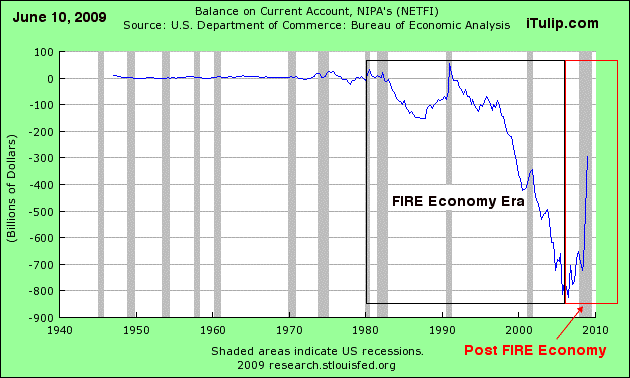 |
Last year’s financial crisis ripped out the thread of credit that held the fabric of our global economy together. Our new iTulip weekly feature of chronicles the unraveling through stories submitted by our readers from around the world. This week’s theme: We demand!
• Spendthrift government demands spending limits on itself
• European socialists demand that America try free markets
• American and French companies demand to not ``Buy American’’
• Japanese smugglers of $134.5 billion in US Treasury bonds demand... wait, what?
Spendthrift government demands spending limits on itself
Last week the Obama administration pushed a brand new government bureaucracy to manage a proposed national health care plan that promised to add trillions to $85.6 trillion in existing public debt and unfunded liabilities. Today the House passed a $4,500 “Cash for Clunkers” rebate program to create an incentive for trade-ins of gas guzzlers for fuel efficient vehicles, presumably to help Government Motors sell their new line of tiny cars that no one wants. The total cost? Who knows?
Yesterday, President Obama in a speech called for Congress to ramp up of fiscal stimulus spending to “create jobs.” Today, the same administration announced its intention to push for new limits on tax cuts and spending programs to avoid adding to deficits.
Obama seeks fiscal responsibility mantle
June 9, 2009 (Reuters - Caren Bohan)
President Barack Obama sought on Tuesday to show he was serious about improving the U.S. budget picture as he called on Congress to pass new limits on tax cuts and spending programs to avoid adding to deficits.
Obama urged passage of "pay-as-you-go" legislation that would require any new tax cut or automatic spending program to be paid for within the budget.
"The 'pay as you go' principle is very simple. Congress can only spend a dollar if it saves a dollar elsewhere," Obama said in a speech at the White House attended by several Democratic members of Congress.
(Hat tip member RickBishop)
June 9, 2009 (Reuters - Caren Bohan)
President Barack Obama sought on Tuesday to show he was serious about improving the U.S. budget picture as he called on Congress to pass new limits on tax cuts and spending programs to avoid adding to deficits.
Obama urged passage of "pay-as-you-go" legislation that would require any new tax cut or automatic spending program to be paid for within the budget.
"The 'pay as you go' principle is very simple. Congress can only spend a dollar if it saves a dollar elsewhere," Obama said in a speech at the White House attended by several Democratic members of Congress.
(Hat tip member RickBishop)

The theory of fiscal stimulus is to run deficits to stimulate the economy out of recession. Simultaneously stimulating it and not stimulating is a novel and, as far as I know, has never been tried. The Obama administration should consider the advice, or rather, the remonstrance of that model of free market philosophy and fiscal prudence, the European Central Bank.
 |
(ECB) The economic crisis and the response of fiscal and monetary policy
But let me hasten to add that policy-makers must not get carried away by recent events; they should act in a measured way, and not throw the baby out with the bathwater. While governments have had no alternative but to support systemically relevant financial institutions, they should, as a rule, keep their assistance to specific sectors or firms to a minimum. And when they do intervene, they should prepare clear and credible exit strategies. No matter how serious the current crisis is, the market economy remains the best way to organise our economic affairs. It is only 20 years ago since the breakdown of the socialist system in eastern Europe, which demonstrated the failures of central planning and heavy government involvement. Therefore, once we emerge from the current crisis, the role of government in the economy needs to be scaled back. Its presence in the banking sector must be gradually reduced as the restructuring of the sector starts to take effect. The stimulus measures must be reversed in due course. We have seen in the past how so-called temporary measures ended up being permanent.
An exit strategy is a comprehensive programme to withdraw and neutralise measures taken during the financial crisis, without causing any harm to the economy. If they have no well-defined exit strategy, governments may get bogged down and the positive impact of the measures taken may be undermined. A well thought-out exit strategy is needed to reassure economic agents that a timely restoration of the level playing field in the different sectors of the economy is the ultimate objective. As such, an exit strategy needs to contain clear criteria about the timing of the withdrawal of the financial support and the reversal of the fiscal stimulus.
Speech by Jürgen Stark, Member of the Executive Board of the ECB
Delivered at the Austrian Industrial Organisation
Linz, Austria, 8 June 2009
But let me hasten to add that policy-makers must not get carried away by recent events; they should act in a measured way, and not throw the baby out with the bathwater. While governments have had no alternative but to support systemically relevant financial institutions, they should, as a rule, keep their assistance to specific sectors or firms to a minimum. And when they do intervene, they should prepare clear and credible exit strategies. No matter how serious the current crisis is, the market economy remains the best way to organise our economic affairs. It is only 20 years ago since the breakdown of the socialist system in eastern Europe, which demonstrated the failures of central planning and heavy government involvement. Therefore, once we emerge from the current crisis, the role of government in the economy needs to be scaled back. Its presence in the banking sector must be gradually reduced as the restructuring of the sector starts to take effect. The stimulus measures must be reversed in due course. We have seen in the past how so-called temporary measures ended up being permanent.
An exit strategy is a comprehensive programme to withdraw and neutralise measures taken during the financial crisis, without causing any harm to the economy. If they have no well-defined exit strategy, governments may get bogged down and the positive impact of the measures taken may be undermined. A well thought-out exit strategy is needed to reassure economic agents that a timely restoration of the level playing field in the different sectors of the economy is the ultimate objective. As such, an exit strategy needs to contain clear criteria about the timing of the withdrawal of the financial support and the reversal of the fiscal stimulus.
Speech by Jürgen Stark, Member of the Executive Board of the ECB
Delivered at the Austrian Industrial Organisation
Linz, Austria, 8 June 2009
(Hat tip to new member cm)
We know our government is in serious trouble when supposedly socialistic governments accuse our oligarchs of giving too much “assistance to specific sectors or firms.” That’s ECB talk for shoveling US public funds that originate as Asian, Middle Eastern, and European savings into the FIRE industries that own our legislature. Or maybe Stark is talking up the euro. In any case, don’t you already miss our fake-capitalist oligarchs now that they have, post crash, turned fake-socialist oligarchs? In the wake of the collapse of the credit bubble, grotesque public micro-management of the private sector is meant to demonstrate government commitment to protect the little guy from corporate evil doers. The result is to punish an army of the innocent for the malfeasance of the few, most of whom get away but for the few caught up in show trials. The populist post technology bubble crash legislation known as Sarbanes-Oxley, an accountant’s job program, saddled public companies large and small with a minimum million dollar annual accounting bill. It pales by comparison to the intrusions into business by the current administration.
New populist policies don’t end with meddling in the compensation programs of public companies. US companies must jump through "Buy American" hoops to catch American taxpayer bailout fish. On company balking at the deal is one of our favorite American technology monopolies, Cisco Systems—which monopoly, in case you forgot, was created out of industry consolidation of networking companies after the crash of the technology bubble in the early 2000s wiped out Cisco's competitors, much as the crash of the credit bubble resulted in the concentration of the investment banking industry into a few gigantic firms with little competition.
Why it’s as if government "regulators" let it happen again on purpose.
 |
Cisco, Alcatel Chafe at ‘Buy American’ Mandate in Stimulus Plan
June 10, 2009 (Bloomberg)
Cisco Systems Inc. and Alcatel- Lucent want “Buy American” provisions waived for a $7.2 billion U.S. program to expand high-speed Internet access, saying the rules are difficult to meet and undermine the economic stimulus program.
Requiring U.S.-made parts would be “grossly inefficient” and a “radical departure” from normal markets, said Cisco, the largest maker of networking equipment. The comments were filed with the U.S. agency running the broadband initiative, part of the $787 billion stimulus package.
The rules may slow projects the stimulus was meant to spur because telecommunications networks contain parts from around the globe, the two equipment makers say. Congress, seeking to boost U.S. jobs, said funds provided under the law passed in February generally can’t be used for iron, steel and factory goods that aren’t U.S.-produced.
June 10, 2009 (Bloomberg)
Cisco Systems Inc. and Alcatel- Lucent want “Buy American” provisions waived for a $7.2 billion U.S. program to expand high-speed Internet access, saying the rules are difficult to meet and undermine the economic stimulus program.
Requiring U.S.-made parts would be “grossly inefficient” and a “radical departure” from normal markets, said Cisco, the largest maker of networking equipment. The comments were filed with the U.S. agency running the broadband initiative, part of the $787 billion stimulus package.
The rules may slow projects the stimulus was meant to spur because telecommunications networks contain parts from around the globe, the two equipment makers say. Congress, seeking to boost U.S. jobs, said funds provided under the law passed in February generally can’t be used for iron, steel and factory goods that aren’t U.S.-produced.
(Hat tip member pksubs)
The entire unseemly sequence of events that followed the crash of the 1980 to 2007 FIRE Economy V2.0 credit bubble is as horrifically predictable as a bad Hollywood horror movie that returns as an even more horrible remake. Call it The Great Depression II: Return of the Idiot Oligarchs. This time the Democrats play the role of populists played by Republicans in the original movie."Protect Your Home Markets from Cheap Alien Competition—Buy American!"
"Buy American Made Goods! Keep the Home Fires Burning!"
"Buy Uncle Sam!"
Hearstpapers. advertisements, handbills, letters, posters were spreading these slogans throughout the land last week. Organizations to boost the "Buy American" idea, adapted from the "Buy British" movement-(see p. 23), have been mushrooming for the last half year. When the Saturday Evening Post featured an exhortation by Samuel George Blythe to "Buy American" early last month, the movement assumed nation-wide proportions. And last week in its behalf William Randolph Hearst turned on his big publicity machine.
Mr. Blythe based his arguments for "Buy American" squarely on the fact that countries with depreciated currencies, low wages or both are able to manufacture goods, ship to the U. S., pay a stiff tariff and still undersell the products of U. S. industry. Czechoslovakia, he cited, can lay down rubber boots in the U. S. at $1.16 a pair. They cannot be duplicated by the U. S. for less than $1.48. Japan sells celluloid combat $11.06 a gross against the best U. S. price of $25.86. Certain grades of European steel are so cheap that even if all labor cost was eliminated, U. S. steel mills could not compete, etc., etc., etc. The results, said Mr. Blythe, are closed factories and unemployment. Furthermore, he insisted, the products are of inferior quality.
Among the first to challenge the article was The New Republic: "[It is] almost a world's record for bad thinking and economic misinformation. It is the quaint notion of Mr. Blythe and the Saturday Evening Post that foreign trade consists exclusively of foreigners selling goods here and taking our money away, as its cartoons show us, in bales. . . . Have these gentlemen 'any suggestions as to how foreigners shall pay for the goods they buy from us?" That, most responsible economists agree, is the biggest flaw in "Buy American." Even last year the U. S. exported about $1,500,000,000 of farm, factory, mine and forest products. Foreign countries must sell to the U. S. goods or services of an equal value or pay in gold. And foreigners have already paid so much gold that many of them have been forced off the gold standard. Japan cannot buy Texas cotton unless she sells electric light bulbs in Boston.
- Business: Buy American, TIME Magazine, January 9, 1933
Foreign countries must sell to the U. S. goods or services of an equal value or pay in gold? Not anymore. Shoe’s on the other foot, so to speak. Today the U.S. must sell to foreigners goods or services of an equal value or pay in Treasury bonds that we print ourselves. Pretty neat, huh? Worked for the 26 years era of the FIRE Economy era, but not anymore."Buy American Made Goods! Keep the Home Fires Burning!"
"Buy Uncle Sam!"
Hearstpapers. advertisements, handbills, letters, posters were spreading these slogans throughout the land last week. Organizations to boost the "Buy American" idea, adapted from the "Buy British" movement-(see p. 23), have been mushrooming for the last half year. When the Saturday Evening Post featured an exhortation by Samuel George Blythe to "Buy American" early last month, the movement assumed nation-wide proportions. And last week in its behalf William Randolph Hearst turned on his big publicity machine.
Mr. Blythe based his arguments for "Buy American" squarely on the fact that countries with depreciated currencies, low wages or both are able to manufacture goods, ship to the U. S., pay a stiff tariff and still undersell the products of U. S. industry. Czechoslovakia, he cited, can lay down rubber boots in the U. S. at $1.16 a pair. They cannot be duplicated by the U. S. for less than $1.48. Japan sells celluloid combat $11.06 a gross against the best U. S. price of $25.86. Certain grades of European steel are so cheap that even if all labor cost was eliminated, U. S. steel mills could not compete, etc., etc., etc. The results, said Mr. Blythe, are closed factories and unemployment. Furthermore, he insisted, the products are of inferior quality.
Among the first to challenge the article was The New Republic: "[It is] almost a world's record for bad thinking and economic misinformation. It is the quaint notion of Mr. Blythe and the Saturday Evening Post that foreign trade consists exclusively of foreigners selling goods here and taking our money away, as its cartoons show us, in bales. . . . Have these gentlemen 'any suggestions as to how foreigners shall pay for the goods they buy from us?" That, most responsible economists agree, is the biggest flaw in "Buy American." Even last year the U. S. exported about $1,500,000,000 of farm, factory, mine and forest products. Foreign countries must sell to the U. S. goods or services of an equal value or pay in gold. And foreigners have already paid so much gold that many of them have been forced off the gold standard. Japan cannot buy Texas cotton unless she sells electric light bulbs in Boston.
- Business: Buy American, TIME Magazine, January 9, 1933

 |
US government securities seized from Japanese nationals, not clear whether real or fake
Milan (AsiaNews) – Italy’s financial police (Guardia italiana di Finanza) has seized US bonds worth US 134.5 billion from two Japanese nationals at Chiasso (40 km from Milan) on the border between Italy and Switzerland. They include 249 US Federal Reserve bonds worth US$ 500 million each, plus ten Kennedy bonds and other US government securities worth a billion dollar each.
Italian authorities have not yet determined whether they are real or fake, but if they are real the attempt to take them into Switzerland would be the largest financial smuggling operation in history; if they are fake, the matter would be even more mind-boggling because the quality of the counterfeit work is such that the fake bonds are undistinguishable from the real ones.
(Hat tip member Sapiens)
Milan (AsiaNews) – Italy’s financial police (Guardia italiana di Finanza) has seized US bonds worth US 134.5 billion from two Japanese nationals at Chiasso (40 km from Milan) on the border between Italy and Switzerland. They include 249 US Federal Reserve bonds worth US$ 500 million each, plus ten Kennedy bonds and other US government securities worth a billion dollar each.
Italian authorities have not yet determined whether they are real or fake, but if they are real the attempt to take them into Switzerland would be the largest financial smuggling operation in history; if they are fake, the matter would be even more mind-boggling because the quality of the counterfeit work is such that the fake bonds are undistinguishable from the real ones.
(Hat tip member Sapiens)
Can you imagine the encounter at the border?
“Nothing to declare?”
“Nope.”
“Got cash or other items in excess of $10,000?”
“Ugh, uh.”
“Mind if I have a look in that briefcase?”
“Errrr...”
“Aha! Just as I thought. You’re carrying hundreds of US Treasury bonds in $500 million and $1 billion denominations worth $134.5 billion.”
“Darn! You caught us.”
“What were you planning to do with these?”
“Buy Estonia, Latvia, and Lithuania. Great price!”
Smuggle? What kind of illicit market exists for $135 billion worth of any security, never mind US government securities? “Nope.”
“Got cash or other items in excess of $10,000?”
“Ugh, uh.”
“Mind if I have a look in that briefcase?”
“Errrr...”
“Aha! Just as I thought. You’re carrying hundreds of US Treasury bonds in $500 million and $1 billion denominations worth $134.5 billion.”
“Darn! You caught us.”
“What were you planning to do with these?”
“Buy Estonia, Latvia, and Lithuania. Great price!”
Fake? Hard enough to sell real ones.
Just ask Geithner.
The only possible buyer for $135 billion worth of anything? A government.
Where did the bonds came from and where they are going? Answer that and we may solve a great mystery: how Japan intends to sell its US Treasury bond hoard before China sells theirs.
It's a scam
Here's our best guess at the scam.
Step 1: Take a large short position in US Treasury bonds.
Step 2: Get your Japanese friends to "smuggle" forged Treasury bonds into a country where you are likely to get "caught."
Step 3: When the rumors fly and the bonds tank, close out your shorts.
Beats working.
iTulip Select: The Investment Thesis for the Next Cycle™
__________________________________________________
To receive the iTulip Newsletter or iTulip Alerts, Join our FREE Email Mailing List
Copyright © iTulip, Inc. 1998 - 2007 All Rights Reserved
All information provided "as is" for informational purposes only, not intended for trading purposes or advice. Nothing appearing on this website should be considered a recommendation to buy or to sell any security or related financial instrument. iTulip, Inc. is not liable for any informational errors, incompleteness, or delays, or for any actions taken in reliance on information contained herein. Full Disclaimer


Comment